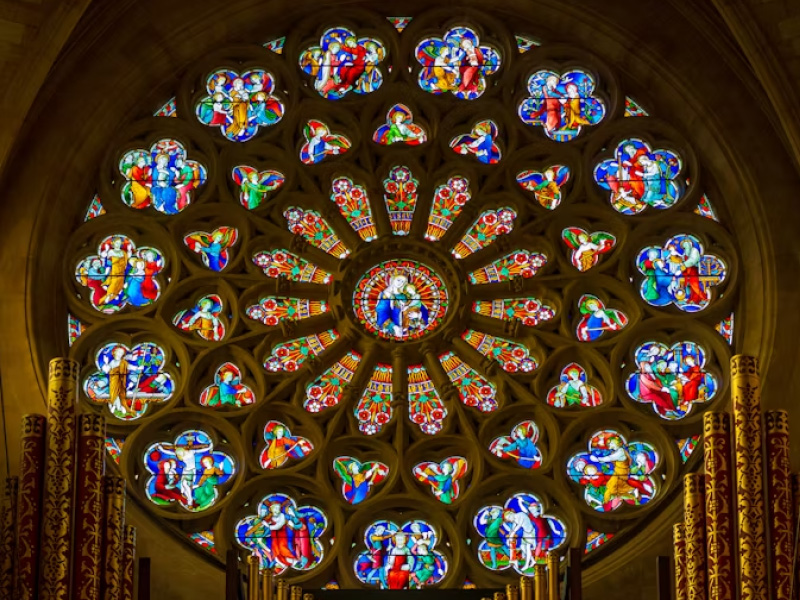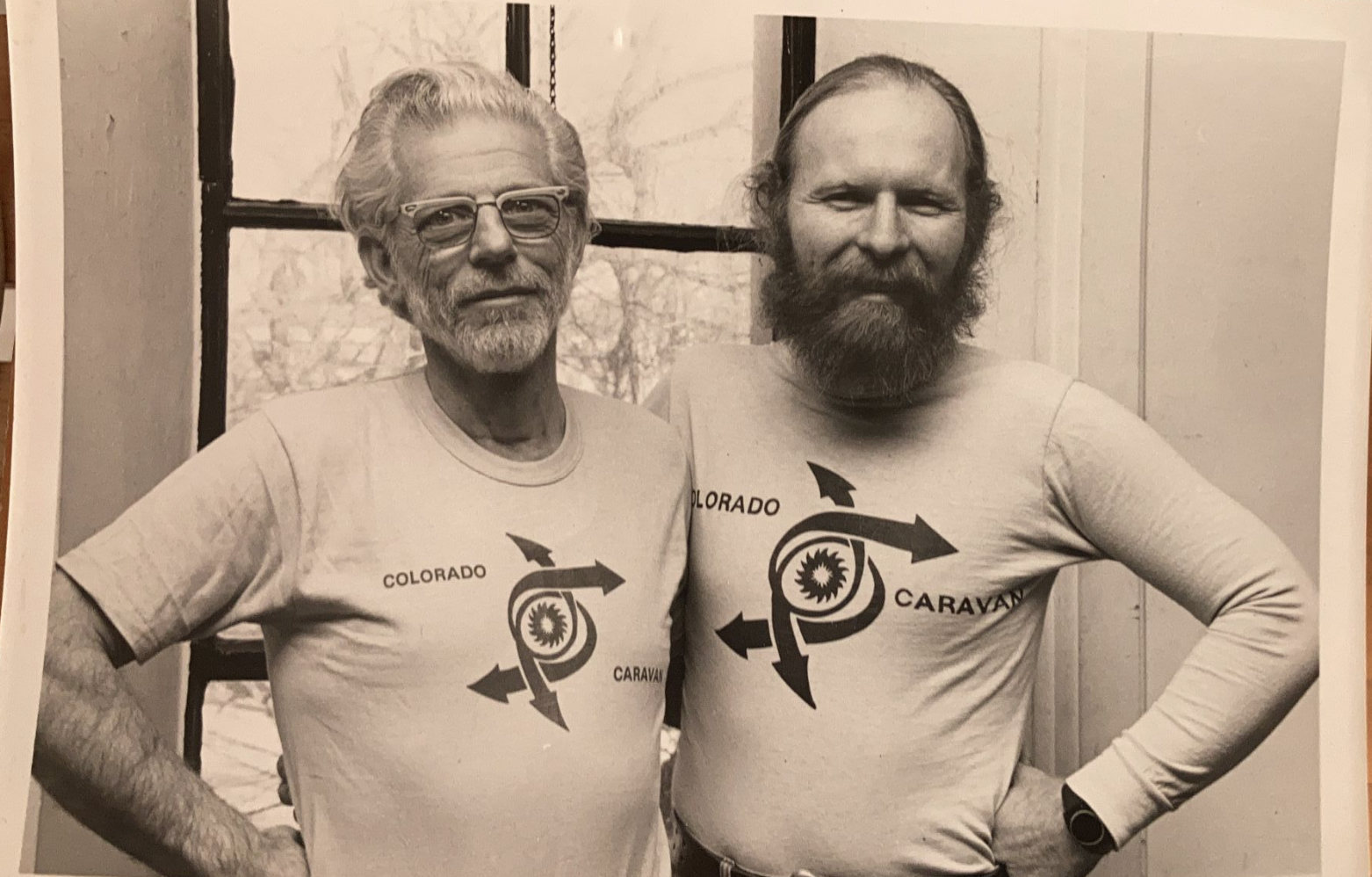The word Hanukkah generally translates from Hebrew to mean dedication. It is an eight-day celebration of a good blessing story. The dreidel is a spinning top used in a game of chance played as part of the Festival. What if we are the dreidel, the game is our life, and we are gambling with God? I explore how that might be happening in this blog. Read on!
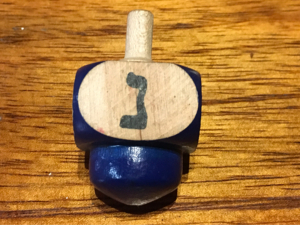
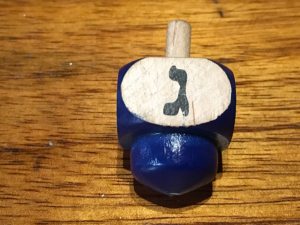
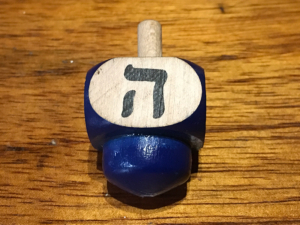
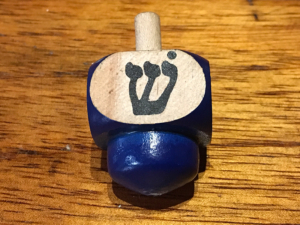
Sometimes a person, even just walking by on the street, says a sentence, phrase or even a word that gets caught in my love of language, and fosters some new path to the unknown. The phrase “Dreidel – gambling with God” came by my ear almost a year ago. I knew only that a dreidel was a kind of top that was part of celebrating the Jewish holiday Hanukkah. Caught by the idea of “gambling with God,” I began a search. Here’s what I discovered, first about dreidels and Hanukkah, and then expanding to a wider cultural and historic view, and then my interpretation of what the phrase means to me one year later.
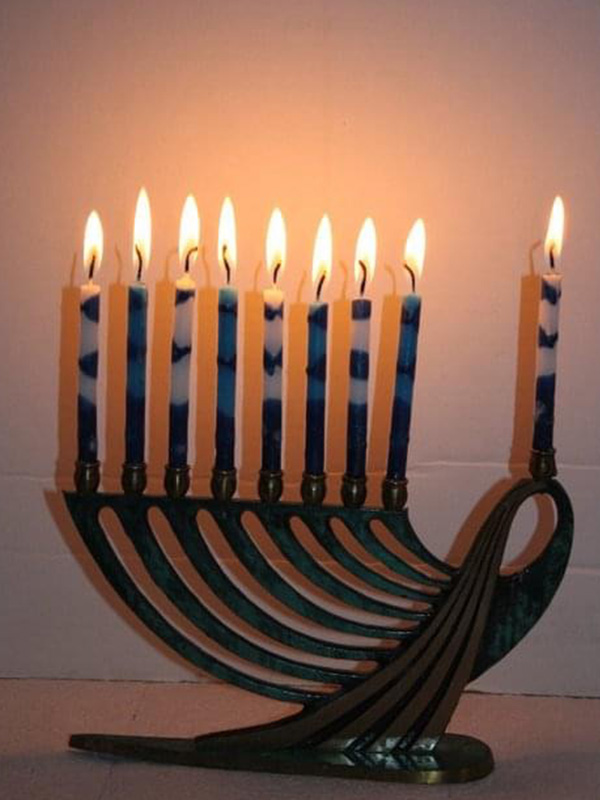
Photo by Arlene Berg Lipman
Hanukkah, A Festival of Lights
The word Hannukuh generally translates from Hebrew to mean dedication or rededication, but also consecration, and inauguration. It is an eight-day celebration, usually falling in December. In 2022 (year of this blog) the dates are December 18-26. It is also spelled Chanukah, Channuka, Hanukkah – all attempts to create the sound of the Hebrew word with English syllables.
There is a special candle holder, a menorah, with space for nine candles. One of the candles is a helper candle called the shammus (Ashkenazi) or shammash (Sephardic) which is lit first, and used to kindle the others. Hanukkah is a festival of light. A friend writes:
I have always loved how the Chanukah holiday is about adding light to life. During the 8 night celebration, we enhance winter’s diminishing light. Each night more light, one more candle – illuminating the family faces as we light the menorah. I like the Chanukah song Sivivon-sov-sov-sov. Here’s a video of the song with transliteration of the Hebrew lyrics. – J.G.
The origin of the festival is rooted in a story of a miraculous blessing in the second century BCE. It involves the military victory of the tiny band of Maccabean forces, led by Judah Maccabee, retaking Jerusalem from an occupying enemy (Seleucid Empire). There follows a rededication of the Second Temple, the first originally built by Solomon. Two books, the First and Second Maccabees, describe the rededication in detail including the lighting of the menorah. But they don’t tell the blessing story.
The Talmud, written 600 years later, tells the story that after the enemy forces were defeated it was discovered that most of the temple ritual olive oil had been opened, or destroyed, or gone missing, and could not be used. One sealed container was left which would be a single day for the Eternal Light in the Temple. The blessing is that the oil lasted for eight days, which evidently was the time needed to press and bless new oil. The Hanukkah menorah commemorates those eight days. The one day’s oil lasting for eight was a source of much joy, and joy is the flavor of the whole holiday. The celebration can include making and eating oil based foods, singing songs, giving gifts, and playing with dreidels.
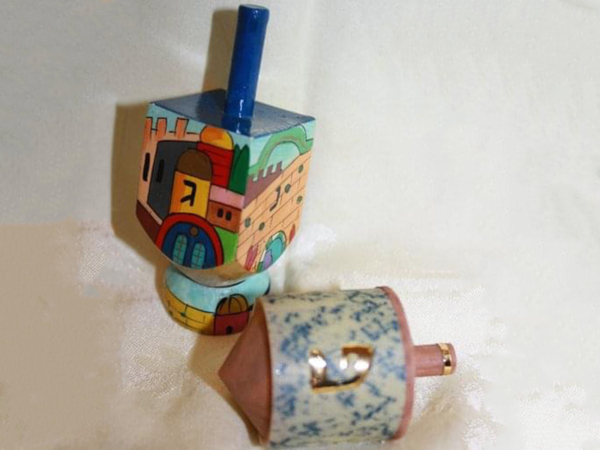
Photo by Arlene Berg Lipman
What is a dreidel?
Dreidel is a noun meaning a small spinning top with four sides, with a Hebrew letter on each side. The word also means the game played with the top. The four letters are Nun, Gimmel, Hey and Shin. The first letters N, G, H, S are an acronym “Nes Gadol Hayah Sham,” or “Nun, Gimel, Hei, Shin” meaning in Israel, “a great miracle happened here.”
The term “dreidel” comes from the Yiddish word dreydl, which means “to turn.” According to Chabad.org, Jewish traditions date the dreidel back to the Maccabean revolt. Because learning about their faith was a crime, people studied together in hiding places. If the enemy came near, the holy books disappeared and the group would be playing Dreidel.
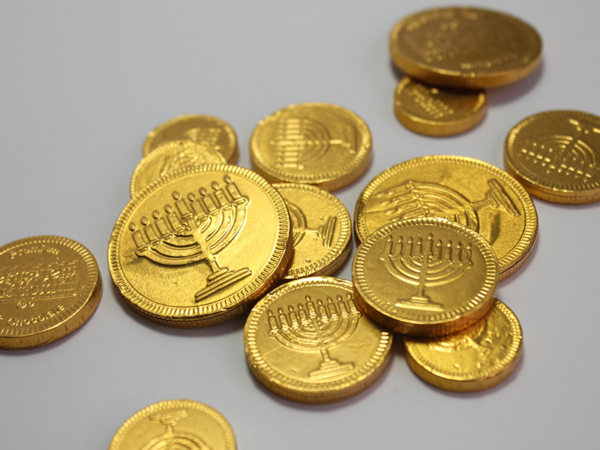
Photo by Joey Dean on Unsplash.
How to play Dreidel
It’s a game of chance. The game can be played by two people, but commonly more. Children and adults play. Everyone sits around a table and has 10 or more game pieces to start. Game pieces are “Gelt” – chocolate coins. Hard candy, dried beans, raisins or other items will work. As in poker, each player antes one piece to the center pot each round of play.
Players take turns spinning the dreidel. Play goes to the left. The first turn goes to the player with the highest symbol (Nun, Gimmel, Hey, and Shin). If there is a tie, those two spin again. On each turn the gelt shifts. The game ends when people decide it will end.
NUN – נ Player does nothing. The person to the left spins.
GIMMEL – ג Player takes whole pot – all ante again, person to the left spins.
HEY – ה Player gets half of the pieces in the pot.
SHIN – ש Player puts another piece into the pot. (“shin, shin, put one in”)
There is another Dreidel song most of us have heard and perhaps sung. The words are “Dreidel, dreidel, dreidel, I made it out of clay. And when it’s dried and ready, oh dreidel we will play.” Following threads (doing research) for this blog I found a fantastic a capella group, Shir Soul, playing Dreidel as they sing this song for four minutes. They sing as the Gelt moves around, as do the Dreidels (each person has a different one each time). Who is singing what part is also moving around, shifting from melody, to harmony, or percussion. Watching the video was the moment I finally understood the Gambling with God comment.
It looks like the game moves very fast. Certainly, when playing, at each roll of the dreidel everything changes. You might win all the gelt, then half, then none, then all – constant motion and change of condition. Roles shift. Outcomes change. I thought if, like Shir Soul, we sing while we play, flawlessly shifting roles as we make the best harmony we can, we too can create joy in playing the game, rather than a personal focus on winning.
Comments from Jewish Friends about Gambling with God
I sent the first draft of this idea of the Dreidel, Hanukkah, and Gambling with God to Jewish friends, and was delighted to receive these comments.
“WE ARE NOT GAMBLING WITH G!D on Hanukkah or any other time. We can argue with the Holy One, wrestle, question, plead, talk, pray, but not gamble. Hanukkah is the result of faith, and perseverance. G!D does not “win.” Please reflect more the message of Hanukkah: we rededicate ourselves, we take joy, we are reminded of victory even against great odds, we remember faith, we see light in the story and each other.” —C.K.S.
“The Hanukkah dreidel is not gambling but rather divination. This is inspiring to me. And like you write, we can be the dreidel. As you know, the Hebrew letters are the sacred sounds of Creation ongoing by which, in Jewish mythology, The Holy is speaking and singing the world alive. As Richard Seidman talks about in his book (The Oracle of the Kabbalah: Mystical Teachings of the Hebrew Letters), Nun, among other things, also means “fish” and “jubilee;” Gimmel means “camel” and “deeds of lovingkindness;” Hei, which appears twice in God’s name, means “behold;” and Shin means “fire,” “shalom,” and “joy.” So the divinatory poetry possible from rolling the dreidel is vast.” —R.R.
“On December 8th 1991, I was in the kitchen, making potato latkes. Our very pregnant dog, Girlie Girl, went into labor just as I finished making the latkes. For those of you who didn’t grow up grating potatoes & onions in December, let me give you some background about the Jewish eight day festival known as Chanukah.
In the 2nd century, Jews were under Greek/Syrian reign, & prohibited from practicing their religion. The Maccabee family led the people in a revolt. My Hebrew school teacher, Mr. Berkowitz, said that most Jewish holidays can be understood like this: “they tried to kill us, they didn’t, let’s eat!”
The food for Chanukah is all about oil – we eat fried potato pancakes, called latkes, with applesauce or sour cream, and we make sufganiyot, fried donuts with powdered sugar. It’s an all carbs, all the time, holiday!
We do exchange gifts each night, but small ones, until the 8th night, when the big, longed-for holiday present appears.
Getting back 1991, Girlie dog, and the 8th night, I brought warm water and clean bedding, and stroked Girlie’s white and pumpkin head as she panted and labored. I didn’t have to worry because Girlie had it all under control, popping out puppies like a pro over the course of several hours.
I kept track of the puppies as they were born. I took notes. Since it was Chanukah, I counted in Hebrew to name the puppies as each one slipped out of Girlie’s womb. The letters of the Hebrew alphabet correspond to numbers, so I just started counting and naming – aleph, bet, gimel, daled, hay, vav, and zayin. When labor was finished, Girlie had given birth to a litter of 7 healthy puppies, which meant that… with mom and her new brood, we had a total of 8 dogs on the 8th night of Chanukah!
My Dad was famous for being a dreidel whisperer, talking quietly to the dreidel while spinning. “C’mon little gimel, c’mon good luck gimel.” Dad somehow conjured many gimels over the years of family dreidel games, and won – a lot! My non-Jewish husband chose which puppy to keep, and without knowing how I had named them, he chose the third born – Gimel (win all). And in picking number three – Gimel – he unwittingly made a significant choice in the context of the holiday: we won big.
Surrounded by candlelight, lots of delicious oily food, a healthy mom and her new litter, we got our good luck Gimel — who lived to be 16 years old, and who always got to eat a little bite of potato latke on her birthday! My wish for you this holiday season is that you and the ones you love are are gifted with lots of light, good health, & good luck.” —J.G.
I liked these three comments for many different reasons. I hope you did also. So far we’ve learned or remembered that Hanukkah is a joyful holiday of light and rededication celebrating a blessing miracle. May we in our time become like the oil that kept the light burning until the new oil was ready.
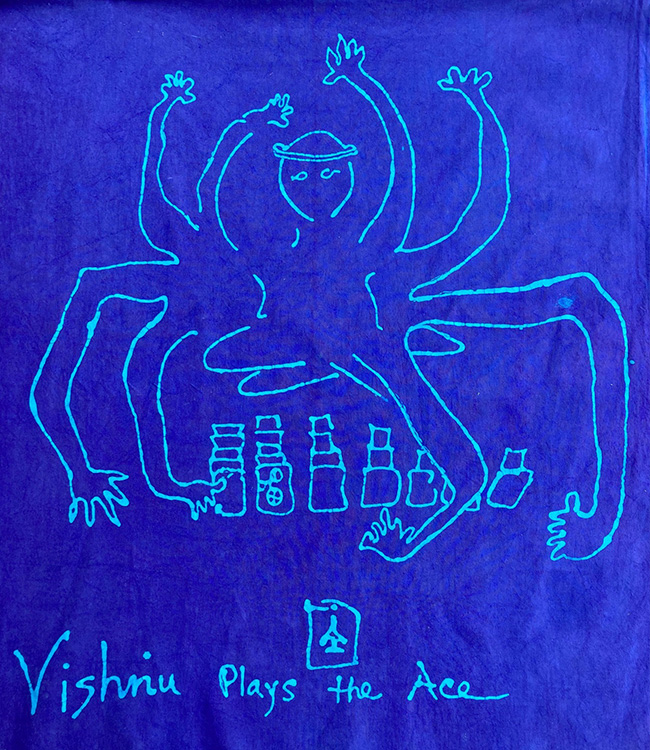
Gambling Gods, Gods of Gambling
Following the threads (research) I’d begun an internet search on cultures that have Gambling Gods. A lot of information is available. The list below is from an article that has some illustrations:
- Lakshmi – The Hindu goddess of wealth and prosperity.
- Hermes – The Greek god of gambling.
- Mercury – The Roman name for Hermes.
- Fortuna – The Roman goddess of fortune and gambling.
- Macuilxochitl – The Aztec god of gambling and games.
- Nohoilpi – The Navajo god of gambling.
Here’s a little bit of information about Fortuna and Hermes/Mercury. And – a Saint of Gamblers!
Fortuna
The Roman goddess Fortuna was Fate… fortune and luck. I know her from Boethius’ Consolation of Philosophy, a book translated from the Latin by every European power ruler until at least Elizabeth I (who also had a copy of Machiavelli’s The Prince). Boethius and his two sons were the Roman Triumvirate. Six months later the sons were dead and he was in jail. The Wheel of Fortune is an image Boethius may have introduced. As it spins your Fortune will be up, down, or somewhere in between. He suggests living instead with Philosophia, and then where you are currently in terms of Fortuna is not the definition of you or your life.
Hermes/Mercury
Usually depicted with winged feet, Hermes is a “messenger” Greek god who knows a lot about every one and every thing. Mercury is called Quicksilver, the metal as a liquid, and is slippery, fast moving and changing quickly. It is very difficult to control.
St. Cayetano
St Cayetano was a Roman Catholic Saint of gambling (and banking). He was born the first of October, 1480 in the Republic of Venice, and died at 66 in the Kingdom of Naples. He cared for the poor in part by creating funding organizations. There is an article listed in the resources area about this saint from Wikipedia that gives his history.
Betting the Devil
There are many western stories where one of the main characters has met the devil strolling about the countryside looking for souls. Usually the agreement made is that in exchange for riches (Gelt) the Devil gets the first thing seen when the gambler goes home. The gambler places the bet, and the rest of the story is how the bet turns in favor of the devil and what happens because of it. In my blog To Be As Clean as We Can, we look at the Handless Maiden tale where it is a betting father’s daughter who is first seen, and who then must rescue herself from the Devil more than once.
Lucky Charms
Although not about Gods of Gambling, faith is put on lucky charms by a large number of people. Often gamblers carry a little statue, jewelry piece, or a “lucky” coin. People comment about wearing a particular shirt or turning a specific cap backwards because the clothing is a lucky piece that will help the team win. People who think about numbers as lucky or unlucky will bet for or against an activity being on a certain date, or living in apartment number 13.
These are all threads about Gambling Gods, and in all of them the Dreidel themes emerge again:
- In the world change is constant.
- You can win, lose, draw, or not play at any moment.
- We can’t let momentary outcomes get us down.
- Take joy in the playing.
- Sing in harmony with our companions.
- If someone needs an ante to play the game, be sure they have the gelt to play.
Life as a Game of Chance – Gambling with God
I’ve spent this year with the phrase, “Dreidel – Gambling with God,” as part of my reflections, and followed various threads like the ones explored above. These reflections rarely came close to what I intuitively felt when I first heard the phrase. I’d like to share what I’m thinking about, and I’d love to hear if any of it resonates with you.
The Bible’s Genesis creation story illustrates how human beings are given free choice. I’ve been thinking about God waiting for Adam and Eve’s choice in the Garden of Eden. Will they eat “the apple,” the fruit of the Tree of Knowledge of Good and Evil? God creates the gamble by giving them the choice. I wonder which way was God betting – that they would or would not eat?
Then there is Jesus’ gamble to come as a final sacrifice and reopen the gate into Eden. All we have to do now is love God and each other. Mary, his mother and his earthly father, Joseph each bet their lives on God’s child. Jesus places his bet on us, but power players throughout history continually hijack the gamble and use their interpretation of Jesus to bet their own agenda.
We could ask which way the dreidel will fall for our planet. We are at a lose or win it all moment.
- Some wealthy people might be betting on a split (HEY) – lose the planet as we know it but they will be going to the Moon and Mars, or an isolated island, or a protected estate.
- One might feel some players are on the take (GIMMEL): take all the profit possible and spread the lie of “not my fault.”
- Parts of Africa are losing it all (NUN) – millions are and will die if we don’t act.
- (SHIN) Others engage and play and will keep doing so (“shin, shin, put one in”).
For us as individuals, here is our life. It is given to us in a moment of chance. We are created to be lovers of life, and joyful in our journeys. We have, at any given moment, complete riches, or nothing, or something in between. We live, we make our gambles, whether it is actual riches or riches of the spirit. We bet on our life with choice after choice after choice.
“All the ways of this world are as fickle and unstable as a sudden storm at sea.
….
The ultimate Mystery of Being, the ultimate Truth, is Love. This is the essential structure of reality. When Dante spoke of the ‘love which moves the sun and the other stars’, he was not using a metaphor, but was describing the nature of reality. There is in Being an infinite desire to give itself in love and this gift of self in love is forever answered by a return of love … and so the rhythm of the universe is created.” —Both quotes from the Venerable Bede
The learning for me: Be the Dreidel – spin so I and the ultimate Mystery of Being set up the rhythm of love. As the song Simple Gifts proclaims, “To turn, turn will be our delight.” The Creator places the bet on us, and I do too.
Questions for reflection and discussion for you below. Scroll to share in the comments if it suits you. Add a question and answer it if you like.
Have you ever thought about the idea of gambling with God?
If so, what was the gamble? How did it play out?
Resources:
Here’s the link to a video of the song, Sivivon-sov-sov-sov, with transliteration of the Hebrew lyrics.
The fantastic a capella group, Shir Soul, playing Dreidel as they sing – you see the game while listening to their fabulous harmonies.
On the history and meaning of Hanukkah.

